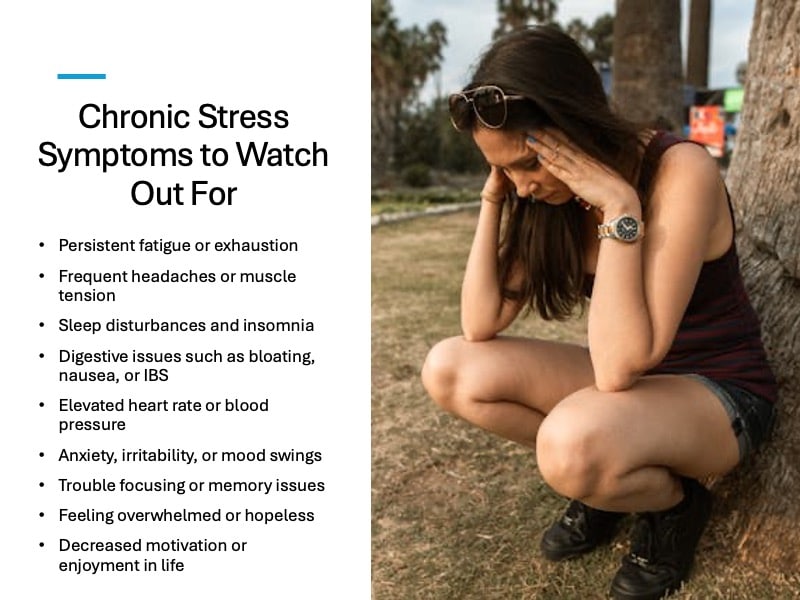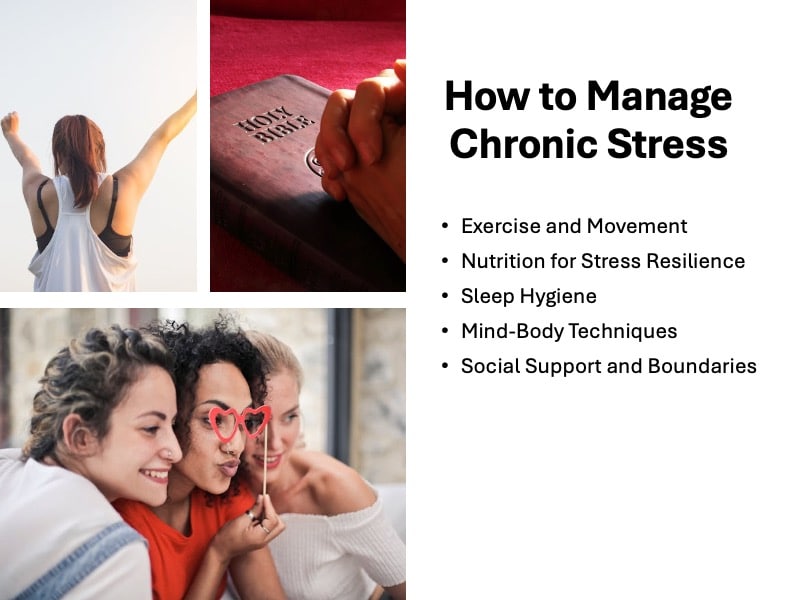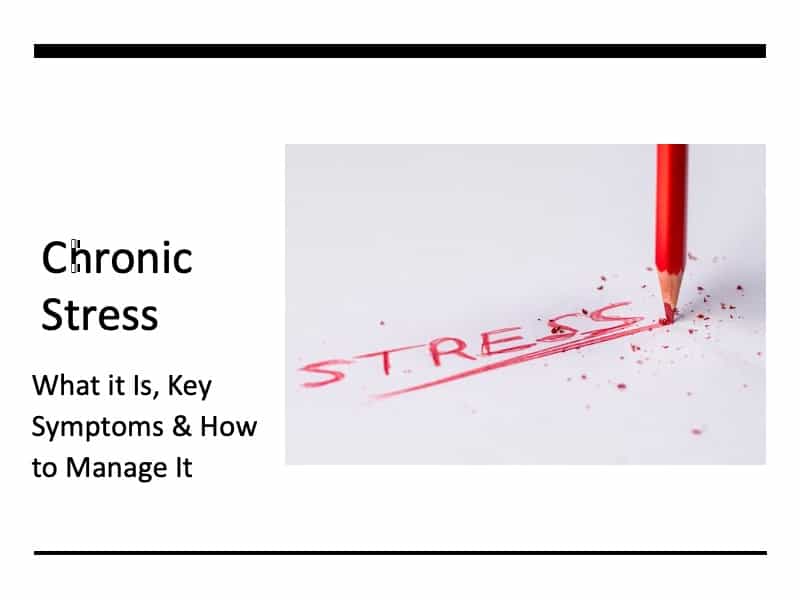Chronic Stress: What it Is, Key Symptoms & How to Manage It
Stress is a universal part of life, but when it becomes constant and unrelenting, it can quietly erode both physical and mental health.
Unlike short-term or acute stress, chronic stress doesn’t fade when a specific situation resolves. Instead, it lingers, building over time, wearing down the body’s defenses, and reshaping the way we think, feel, and function each day.
As a professional basketball player for over a decade, I’m no stranger to the effects of chronic stress.
I’ve spent years under intense pressure, being constantly evaluated by coaches, questioned by the media, and knowing that one off day could mean losing my spot to another player.
That kind of stress doesn’t turn off when the game ends.
Outside of basketball, I’ve also managed personal challenges like Tourette Syndrome, a condition I’ve dealt with since childhood.
Combine that with the usual life stressors like injuries, finances, and family responsibilities, and I’ve had to become a student of stress management just to stay healthy and perform at a high level.
Through lived experience, formal education in Nutrition Education, and countless hours of personal research, I’ve learned how chronic stress impacts the body, from disrupting sleep and immune function to increasing the risk for anxiety, depression, and chronic disease.
More importantly, I’ve discovered practical, sustainable strategies to keep stress from taking control.
In this guide, you’ll learn what chronic stress really is, how to recognize its key symptoms, and science-backed strategies that can help you regain control physically, mentally, and emotionally.
What Is Chronic Stress?

Chronic stress is a prolonged state of emotional and physiological arousal that occurs when the body is repeatedly exposed to persistent stressors without sufficient time or resources for recovery.
Unlike acute stress—which is short-lived and often resolved once the threat has passed—chronic stress lingers, gradually wearing down the body and mind.
This form of stress stems from unresolved or recurring pressures, such as financial instability, work overload, caregiving demands, or long-term health issues.
The defining characteristic of chronic stress is its relentless activation of the stress-response system, keeping cortisol and adrenaline levels elevated over time.
Left unchecked, chronic stress disrupts the body’s natural homeostasis, impairing key systems including the cardiovascular, immune, metabolic, and nervous systems.
It also increases vulnerability to mental health disorders such as anxiety and depression, often without obvious or immediate symptoms.
What makes chronic stress especially harmful is that it often becomes normalized.
People adapt to feeling overwhelmed, fatigued, or tense, assuming it’s “just part of life,” while their health silently deteriorates in the background.
Acute vs. Chronic Stress: The Crucial Differences

Understanding acute vs chronic stress is essential because each type affects the body differently and requires distinct management strategies to prevent long-term health consequences.
Stress isn’t inherently harmful. In fact, acute stress is the body’s natural response to immediate challenges—like a job interview or a high-pressure game.
It spikes adrenaline and cortisol, sharpening focus and reaction time.
However, when stress becomes persistent and unrelenting, it transforms into a chronic condition that taxes every system in the body.
- Acute stress typically resolves quickly. It’s episodic and short-term, often caused by situational triggers.
- Chronic stress, on the other hand, builds over time. It stems from ongoing circumstances like financial pressure, toxic work environments, or strained relationships.
Without intervention, chronic stress can lead to burnout, inflammation, and serious disease.
Examples of Chronic Stress
Chronic stress often develops gradually, making it difficult to recognize until it becomes overwhelming.
Identifying common real-life examples of chronic stress can help individuals become more aware of the persistent pressures affecting their mental and physical well-being.
- Long-term financial instability
- Caregiving for a chronically ill loved one
- High-pressure work environments with no relief
- Enduring relationship conflict
- Living in an unsafe or unstable home environment
The key feature of chronic stress is the absence of recovery time, leaving the body in a near-constant state of fight-or-flight.
Chronic Stress Symptoms: What to Watch For

Recognizing the symptoms of chronic stress early is essential for preventing long-term damage to both mental and physical health.
While the signs of chronic stress can be subtle at first, they often escalate over time, affecting energy levels, mood, focus, and overall well-being.
Physical Symptoms of Chronic Stress
Chronic stress doesn’t just impact the mind, it leaves a lasting imprint on the body as well.
The physical symptoms of chronic stress often develop gradually, signaling that the body is under prolonged strain and struggling to maintain balance (McEwen, 2017).
- Persistent fatigue or exhaustion
- Frequent headaches or muscle tension
- Sleep disturbances and insomnia
- Digestive issues such as bloating, nausea, or IBS
- Elevated heart rate or blood pressure
Emotional & Cognitive Symptoms
Chronic stress can significantly affect how we think, feel, and respond to everyday situations.
The emotional and cognitive symptoms of chronic stress often include changes in mood, focus, and motivation, making it harder to stay present, productive, and emotionally balanced (Liu et al., 2020).
- Anxiety, irritability, or mood swings
- Trouble focusing or memory issues
- Feeling overwhelmed or hopeless
- Decreased motivation or enjoyment in life
These symptoms often lead to maladaptive coping mechanisms, such as overeating, substance use, or social withdrawal, which only exacerbate the problem.
Long-Term Effects of Chronic Stress
Over time, chronic stress dysregulates nearly every bodily system.
The HPA axis remains in overdrive, releasing excessive cortisol and adrenaline (Herman et al., 2016).
This cascade promotes systemic inflammation and impairs metabolic and immune function.
Chronic Stress Can Contribute To:
- Cardiovascular disease: Elevated blood pressure and chronic inflammation
- Type 2 diabetes: Cortisol-induced insulin resistance
- Obesity: Particularly abdominal (visceral) fat gain
- Cognitive decline: Hippocampal shrinkage and memory impairment
- Anxiety and depression: Neurotransmitter imbalance and amygdala overactivation
Chronic Stress Treatment: Natural Strategies That to Help Manage Chronic Stress

Managing chronic stress doesn’t always require medication or clinical intervention. In many cases, consistent lifestyle changes rooted in evidence-based practices can significantly reduce the physiological burden of stress and restore emotional balance.
The key is addressing both the mind and body, while staying consistent in daily habits that promote healing, recovery, and resilience.
Here are some of the best natural remedies for stress that actually work:
Exercise and Movement
Regular physical activity is one of the most powerful tools for stress relief.
Exercise regulates cortisol, boosts endorphin production, and improves both mood and energy levels.
- Cardio workouts such as brisk walking, swimming, cycling, or dancing increase oxygenation and stimulate the release of feel-good neurotransmitters.
- Meanwhile, strength training improves metabolic health, supports hormonal balance, and helps reduce systemic inflammation—one of the hidden drivers of chronic stress.
- Low-impact movements, such as foam rolling, stretching, or mobility exercises, can be especially helpful for those who feel physically depleted.
They offer gentle ways to reconnect the body and mind.
Nutrition for Stress Resilience
What you eat directly affects how you feel and how well your body manages stress.
A nutrient-dense, whole-foods-based, well-balanced diet supports nervous system function and reduces inflammation, both of which are critical under chronic stress conditions.
Prioritize foods rich in:
- Omega-3 fatty acids (salmon, flaxseed, walnuts) to reduce inflammation and support brain function
- Magnesium (leafy greens, dark chocolate, pumpkin seeds) to calm the nervous system and relax muscles
- Antioxidants (berries, turmeric, green tea) to counter oxidative stress
Also, support your gut-brain axis with probiotic-rich foods like kefir, yogurt, kimchi, and sauerkraut, or consider a high-quality probiotic supplement to promote serotonin and dopamine production.
Additionally, avoid excess refined sugar, caffeine, alcohol, and ultra-processed foods, which spike cortisol, disrupt blood sugar stability, and contribute to mood swings and energy crashes.
As a final addition to your well-balanced diet, certain herbs and nutrients, known as adaptogens, can support the body’s ability to adapt to stress and restore internal balance.
These natural compounds help modulate the HPA axis and promote homeostasis.
Popular adaptogens include:
- Ashwagandha – Reduces cortisol levels and supports adrenal health
- Rhodiola rosea – Enhances energy and improves stress resilience
- Holy basil (tulsi) – Calms the nervous system and supports mood balance
Supportive supplements may also include:
- Magnesium – Especially in magnesium glycinate or magnesium threonate form for relaxation and cognitive function
- B-complex vitamins – Crucial for energy metabolism and nervous system support
- L-theanine – An amino acid found in green tea that promotes calm focus without drowsiness
Sleep Hygiene
Chronic stress and poor sleep often go hand-in-hand, creating a vicious cycle that’s difficult to break. High cortisol levels can delay melatonin production, making it harder to fall asleep and stay asleep.
Improve your sleep hygiene with these foundational practices:
- Stick to a consistent sleep schedule, even on weekends
- Eliminate blue light exposure from phones and screens at least 60 minutes before bed (Silvani et al., 2022)
- Create a calming bedtime routine such as light stretching, reading, or listening to calming music
For additional support, consider natural sleep aids like:
- Qunol Magnesium Glycinate to relax muscles and promote deeper sleep
- Chamomile, lemon balm, or passionflower teas, which gently calm the nervous system without dependence
Last update on 2025-04-15 / This article includes affiliate links/Images via Amazon Product Advertising API. I may earn commissions on purchases made through these links.
Mind-Body Techniques
The mind and body are intricately connected, and managing one helps regulate the other.
In addition to the evidence-based practices listed below, many people, including myself, find immense comfort and relief through daily prayer, which not only offers spiritual grounding but also enhances feelings of peace, safety, and emotional clarity during times of prolonged stress.
Other mind-body techniques include:
- Diaphragmatic breathing (belly breathing) to stimulate the vagus nerve, reduce heart rate, and lower blood pressure
- Progressive muscle relaxation, which systematically releases physical tension from the body
- Mindfulness meditation, which trains awareness and reduces emotional reactivity by calming the amygdala
- Guided imagery or visualization, helping individuals mentally escape from stress-inducing environments
- Gratitude journaling, which rewires the brain to focus on what’s positive, fostering resilience and perspective
Practicing these tools regularly, even for just 5 to 10 minutes a day, can significantly enhance your capacity to recover from stress.
Social Support and Boundaries
Humans are hardwired for connection, and emotional support is critical for navigating prolonged stress.
Conversations with trusted friends, mentors, or mental health professionals can reduce feelings of isolation and help you process emotions constructively.
In addition to seeking support, setting clear boundaries is vital.
Chronic stress often arises when people overextend themselves or feel obligated to meet unrealistic expectations.
- Learn to say no without guilt
- Delegate responsibilities when possible
- Protect your time with non-negotiable self-care blocks in your schedule
- Reduce exposure to toxic relationships or environments that chronically trigger stress responses
Establishing these boundaries creates the space you need to rest, recover, and prioritize your well-being.
When to Seek Professional Help
If stress begins to interfere with your daily life or feels unmanageable despite your best efforts, seeking professional help can be an important step in learning how to relax and not worry as much about things outside your control.
Chronic stress left untreated can lead to serious medical and psychological conditions.
Mental health is just as vital as physical health, and consulting a a licensed therapist, psychologist, or healthcare provider.
Professional intervention, whether through Cognitive Behavioral Therapy (CBT), EMDR, or psychiatric evaluation, can be life-changing.
Final Thoughts: How to Deal with Chronic Stress & Build a Resilient Life

The key to managing chronic stress is developing sustainable, daily habits that support nervous system regulation and emotional resilience.
- Schedule daily decompression routines—walks, music, baths, journaling.
- Pace your day to prevent overload—don’t wait until you break.
- Regularly evaluate your environment—identify what fuels your stress and what brings peace.
- Recognize progress, not perfection. Consistency in small habits adds up.
Chronic stress doesn’t need to define your life.
By recognizing its signs early and committing to healthy, consistent habits, you can protect your mental and physical well-being.
Small changes, like deep breathing before meals, five-minute breaks every hour, or swapping soda for herbal tea, create momentum.
Over time, these micro-adjustments build a foundation of resilience, helping you thrive in a demanding world without being overwhelmed by it.




